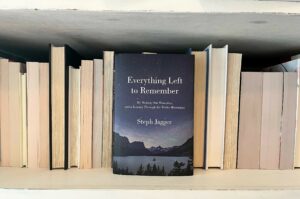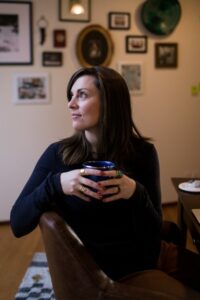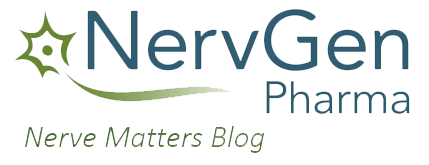By Codi Darnell
August 23, 2022
 Alzheimer’s disease takes – it takes individuality, cognition, independence, recognition until all that’s left is the story of who a person used to be. For Steph Jagger, the reality of this progression became personal when her mother was diagnosed with the disease. Armed with the desire to spend time with her mom before she truly lost her to Alzheimer’s disease, the two of them embarked on a road-trip – two weeks camping, horseback riding, and tenting in the Rocky Mountains – the results of which Steph shares in her memoir Everything Left to Remember.
Alzheimer’s disease takes – it takes individuality, cognition, independence, recognition until all that’s left is the story of who a person used to be. For Steph Jagger, the reality of this progression became personal when her mother was diagnosed with the disease. Armed with the desire to spend time with her mom before she truly lost her to Alzheimer’s disease, the two of them embarked on a road-trip – two weeks camping, horseback riding, and tenting in the Rocky Mountains – the results of which Steph shares in her memoir Everything Left to Remember.
Steph not only brings us along on their trip, but through her memories. She reflects on her mother’s life, her own life, and all the ways in which they intersect, while showing us all there is to lose. But even in sharing the progression of disease, Steph ensures her mother’s essence lives on within the pages of this book, striking a beautiful balance between the truths of Alzheimer’s disease, and the truths of her mother beyond the illness.
Everything Left to Remember not only takes the reader through two weeks in the Rocky Mountains, but through a lifetime of memories, and a soulful journey of reflection. It is women and earth, mothers and daughters, life and disease, connection and release. Yes, it’s for anyone who has lost a loved one to Alzheimer’s disease, but it’s also for anyone who aims to understand themselves and their relationships better.
Steph Jagger graciously agreed to meet with me and answer some of my questions. The following interview has been edited for length and clarity.
There are a lot of logistics involved in a camping trip: tent set-up and take-down, bathrooms, food, warmth, and sun and bug protection (just to name a few). With all that in mind, what was it that made you decide that camping was the right type of trip for you to take with your mom?
There were a few reasons, like the cost and the desire for a challenge. But ultimately, I really wanted the trip to be outdoors, for us to be spending time in nature. Not only because I personally love it, but because my mom, for a long time, has been a real nature lover. Growing up we were a very athletic family, but not a very outdoorsy family. However, I think that was more because my dad doesn’t like to get dirty (he needs to have a place to shave) and my mom would have loved to go on more outdoorsy trips. Because this trip was just her and I, I really wanted to make sure it was in the outdoors because I think it was something she loved all her life and wanted to do more of.
I knew my dad would say no to this trip and that it would knock her socks off. That’s why we went.
Embarking on a trip with a loved one who is dealing with dementia is a big undertaking. What advice would you have for someone who is hoping to recreate the intimate travel experience you had with your mom?
I would really trust what you know of your loved one, what they love to do and what they are capable of doing given the stage of Alzheimer’s disease that they’re in. I often get feedback like “I was clenching my jaw that you were going to take this woman into the woods”, but I knew my mom’s physical capabilities, where she was in the progression of the disease. She wasn’t so far progressed that she couldn’t handle it, she was fully physically capable. And I think that speaks to how society typically imagines someone with Alzheimer’s disease or dementia. We imagine the later stages where a person has a hard time walking, difficulty eating, an inability to speak. The early stages where the individual is still there and able to do so much are often forgotten.
But definitely the biggest thing to ask yourself is “What do I know that my loved one is physically capable of and can handle from a travelling standpoint?” and then go from there.
 Would you recommend taking advantage of the time you have with your loved one during the earlier stages of dementia?
Would you recommend taking advantage of the time you have with your loved one during the earlier stages of dementia?
Absolutely I would. However, that means being able to acknowledge the dementia. There is still a lot of stigmas around Alzheimer’s disease, and a lot of people don’t say they have it or the family doesn’t talk about it until it’s too obvious to ignore. In those cases, people may lose the opportunity to spend this time together, to take the kind of trip like I took with my mom. So, it’s in the willingness to acknowledge the disease that allows you to take advantage of the time you have in the early stages. And that’s a tough thing as well, to be open about what’s going on with the person, with their memory, and with the family.
During your trip you visited Old Faithful, the famous geyser in Yellowstone National Park. Your observation of how the crowds cleared as soon as the show was over and when there was nothing more to see really resonated with me. In your experience, does that mirror the journey with Alzheimer’s disease? Do most people back away and disappear as the person gives way to the disease?
Nobody has made that connection before but yes, it definitely mirrors the experience. I think people pull away because they are unsure of how to connect with someone when there aren’t shared memories or identities to rely upon. Someone might think, for example, “What is the point of going to visit if they’re not going to remember and it’s going to be painful for me?” but there are ways to connect without shared memories and experiences.
Like sitting at Old Faithful, we didn’t need to know who each other were, we didn’t need to know the name of the geyser, we didn’t need to know where we were or why. But to sit together and watch something that beautiful, to have our bodies feeling it at the same time, that’s a profound form of connection.
I can visit my mom and she may not know who I am or be able to say, “Steph came into visit me and it felt wonderful.” but, if my hand on her back can give her a sensation of relief or comfort, that’s worth it. Why would we hold that kind of care back? However, it does involve a willingness to sit in some discomfort or in what might seem as boring. But if you sit long enough inside that space, slow down and endure what isn’t comfortable, there is something beautiful to be witnessed.
If you could go back to a time before the Alzheimer’s disease, what is one question you would ask your mom?
There is this thought that I would have some big questions, but I’m not sure I do. I could feel the little girl version of me asking, “Did you love me?”, but at the same time, I know the answer to that.
I’m satisfied with the knowledge I have of her life and her story, and whatever parts I don’t know were sacredly hers. And I think it’s beautiful that she held those.
What I can think of and, I don’t know if the mother that was my mother before Alzheimer’s disease would be able to answer this, but on some larger soul level, I would have loved to ask her, “Could you teach me how to hold things as firmly as you did, as tightly as you did, and at the very same time as loosely?”; that is something she embodied. You felt held by her but also set free. For the person in me that wants to control everything, I would love to say to her, “Could you teach me that?”
The journey you’ve so beautifully depicted in your book was one you clearly hold close to your heart. How did you cope with the fact that this transformative experience with your mom was one she couldn’t hold in her own memory?
When we returned from our trip and my dad asked my mom how it went, I realized she couldn’t pull it up in her mind. There was a sting with that realization and I remember thinking, “Wow, that was quick.”, and yet I knew going into the trip that she was not going to remember it. The harder thing to hold is further back than that – that the entirety of the person she helped to shape, she can’t hold in her memory; that’s been so much harder to cope with. One of the gifts of family members and long-term relationships is that people have been witnessing you and have had eyes on you in your life and your ups and downs, good times and bad times for a long time; that is a gift. Coping with that loss is and was much harder to cope with.
Alzheimer’s disease has taught me how to be porous. Things will strain through and will be forgotten. And it has taught me how to see the absolute beauty and preciousness in the fleeting moments of our lives. But I wrote this book and now neither of us have to hold it in our memories. Because one day I too will forget and will be forgotten, but even then, the book will remain.
For more information on Steph Jagger and Everything Left to Remember, visit her website or connect with her on Instagram.
For information on NervGen Pharma Corp., a clinical stage biotech company dedicated to creating innovative solutions for the treatment of nervous system damage, please follow us at www.nervgen.com.
